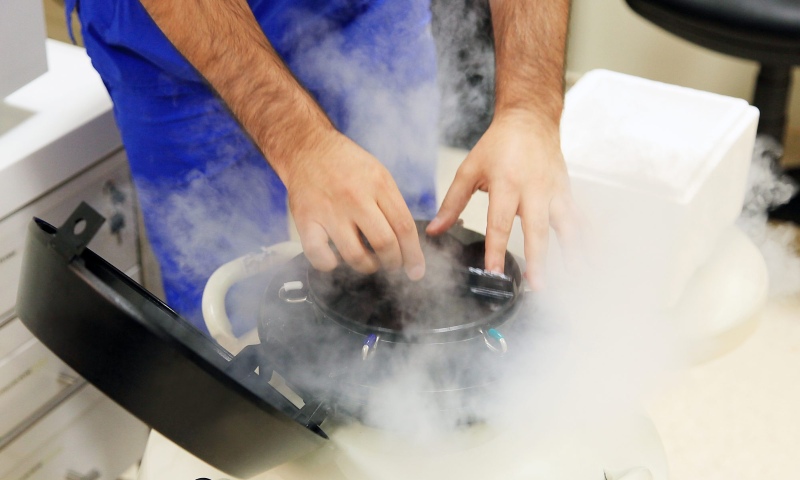In the 21st century, women have a wide variety of options. They can pursue advanced degrees and competitive careers, settle into marriage or remain single, and essentially travel every avenue that captures their interest. It’s a wonderful time in history to be alive and female, not least because of the freedom to make choices and create a lifestyle of one’s own choosing. Unfortunately, fertility is still tied to biological factors like age. What if you are a woman who wants children someday but needs more time to accomplish all you want to do before embracing motherhood? What if you have not yet found a partner with whom you’d like to procreate? Or, worse, what if your fertility is endangered by an illness that threatens to derail your plans? Freezing eggs is an option that allows women to delay motherhood until the time is right and they’re ready.
Also known as cryopreservation, egg freezing involves having eggs extracted, frozen, and stored for future use. This can give you the option of conceiving later on, even if your fertility has waned because of aging, medical treatment, or a health condition. The egg freezing process is similar to the process used to retrieve eggs used in in-vitro fertilization, with the difference being that the eggs are stored afterwards, rather than being fertilized and transferred to the uterus. It’s a multi-step process, but not as complicated as you might assume.
- The first step is the use of medications to stimulate the ovaries and cause them to produce multiple eggs. This is typically done at home, with the patient self-injecting hormones every day for 10 to 12 days. The purpose of this is to encourage a large group of eggs to develop all at once.
- While waiting for the eggs to develop, the woman will visit the fertility clinic regularly. There will be about four to six pelvic ultrasounds, along with frequent bloodwork, in order to track the development of the eggs.
- Once the eggs are judged to be mature, there will be an outpatient surgical procedure to retrieve them. The eggs will be retrieved by ultrasound-guided needle aspiration, while the patient is under anesthesia, in a process that takes 20 to 30 minutes to complete. Using ultrasound for visualization, the physician guides a needle through the vagina and into the ovaries to procure the eggs.
- An embryologist will then examine the eggs for viability. This is a person trained to analyze eggs and embryos, and he or she will determine whether the eggs are mature and able to become fertilized. If they are, they can then be frozen.
Once it’s time to actually freeze eggs, the egg freezing procedure becomes a little bit more complicated. This is because eggs are somewhat difficult to freeze and thaw. Sperm and embryos have been successfully frozen for many years, but that’s because they do not contain as much water as eggs. Because eggs contain a high percentage of water, they can form ice crystals when they are frozen, which destroys the structure of the cell. To avoid this possible complication, a highly specialized technique called vitrification can be used. Vitrification means “turning to glass” and it is a rapid method of freezing eggs. To accomplish it and prevent the formation of ice crystals, water is removed from the egg cells of the collected eggs. The eggs are then quickly frozen and stored in liquid nitrogen tanks for later use. This method is not experimental and in fact is very effective and has been in use since the 1980s. It’s unknown how long eggs can be frozen and remain viable, but frozen embryos have resulted in successful pregnancies after having been frozen for over a decade, so it is assumed that frozen eggs would behave similarly. It is generally recommended to have at least 20 eggs frozen at a time, because eggs are not always viable and having a significant number increases the probability of being able to carry more than one child.
When it is time for the eggs to be used, they must be quickly thawed. This is done in a reversal of the vitrification process. It should be noted that the freezing process can compromise the egg, making it more difficult for sperm to penetrate it. For that reason, it’s best to use an assisted reproductive technology called intracytoplasmic sperm injection (ICSI), which involves injecting one sperm directly into the egg. When an embryo results, it is transferred to the woman’s uterus in hopes of a successful pregnancy. To promote the goal of sustained pregnancy, the patient must take additional medications and hormones. Typically, six to eight eggs are thawed, so that there can be multiple attempts at achieving pregnancy, if necessary. When 20 eggs are frozen, thawing six to eight still allows for further attempts in the future.
Is freezing your eggs a good option for you? This is something to discuss with a fertility specialist. Women choose to freeze their eggs for a number of reasons, including the risk of losing fertility because of cancer or premature ovarian insufficiency (POI). POI is a condition that happens in women under age 40, some as young as teenagers. POI can be caused by genetic disorders like Turner syndrome, autoimmune diseases like lupus, or cancer treatments like radiation, chemotherapy, or surgery. A family history of early menopause can also be a factor, but sometimes, the cause of premature ovarian insufficiency is unknown. If you do know that you are at risk, however, there are many different options for fertility preservation. Frozen embryos can be created through IVF and stored for future use, or you can choose to use donor eggs when the time comes to conceive. If you are not ready to fertilize your eggs, though, and you want a biological connection to future pregnancies, egg freezing may be the right method for you to choose.
For women with cancer, eligibility for cryopreservation can depend on the type of cancer and the time available to complete the fertility preservation process before beginning cancer treatment. For healthy women, however, a major factor is the biological clock. The number and quality of a woman’s eggs decrease as she gets older, and by age 30, the four million eggs a woman had a birth has decreased to about 100,000. At menopause (typically between 45 and 55 years of age) ovulation ceases entirely. Because the supply of eggs begins to rapidly decline around age 37, and by age 43, most of a woman’s eggs don’t have the potential for pregnancy, it’s imperative that someone seeking to freeze eggs does it early. The ideal age to freeze eggs is considered to be between 25 and 37. However, while freezing eggs before the age of 40 is the best way to improve the likelihood of achieving pregnancy, it’s not unheard of to freeze them at an older age. A reproductive endocrinologist can provide testing, and egg freezing can be considered on a case-by-case basis.
While the process of freezing eggs is not painful or dangerous, there are some side effects that commonly go along with it. Typically, they are not severe, but are a natural result of the elevation of hormone levels caused by ovary stimulation. Fluctuations in hormone levels can cause mood swings, hot flashes, headaches, and nausea. After going through the egg retrieval process, some women experience bloating, cramping, and mild pain. However, since the entire process takes only about two weeks from start to finish, most women find the side effects bearable and worth enduring to accomplish the goal of preserving fertility.
Many people have concerns about the cost of freezing eggs, since fertility treatments are sometimes costly. The egg freezing process can get expensive, because it involves medication, ultrasounds, bloodwork, egg retrieval, and egg freezing. However, there are many options available to help defray the cost of fertility preservation, including insurance, financial assistance, and even government funding. If you believe that freezing your eggs is the right course of action for your family, talk to NewLife Fertility about your options for affordable care before dismissing the process as too expensive.
If you have need of assistance in starting your family or you are looking for more information about freezing your eggs or other methods of preserving your fertility, trust NewLife Fertility to assess your needs and apply effective services that work best for you. We are committed to providing patient-centered, effective, innovative, and safe reproductive care in order to help people fulfil their dreams of a healthy family. Beyond just providing fertility treatment, we instill hope by offering advice, experience, and a proven track record of success for infertility patients. Since 2004, we’ve provided the comprehensive care that is essential to successful fertility outcomes, and our success rates have made us one of the top fertility centres in Canada. For more information or to schedule an appointment, contact us through our website.



